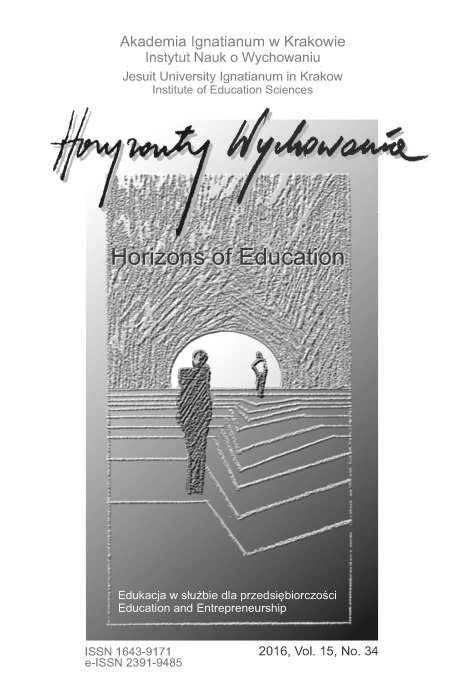Przedsiębiorczość oraz kreatywność jako kompetencje społeczne wymagane na różnych kierunkach kształcenia akademickiego
Entrepreneurship and creativity as social competences required in various fields of study at universities
Author(s): Anna SladekSubject(s): Business Economy / Management, Adult Education, Organizational Psychology, Behaviorism, Methodology and research technology, Sociology of Education
Published by: Uniwersytet Ignatianum w Krakowie
Keywords: education; entrepreneurship; creativity; education for entrepreneurship; educational outcomes; social competences;
Summary/Abstract: Research objective: The aim of the paper is to describe the understanding of two social competences: entrepreneurship and creativity. The description is based on the analysis of the documents presenting learning outcomes within various educational fields of study. The understanding of these competences is the basis for designing the educational process. The research problem and methods: The research problem is focused on identifying differences and similarities in the understanding of entrepreneurship and creativity within various educational fields of study. The author of the paper analyses the extent to which these attitudes are connected with the way of teaching a given university subject. The methods chosen for the study are document analysis and qualitative content analysis. The process of argumentation: This paper reports the results of the content analysis of social competences in various fields of education and in selected faculties at different universities. Research results: The results of the analysis indicate that entrepreneurship and creativity are perceived in rather general terms in almost all fields of study. Most commonly, entrepreneurship is understood as shaping students’ awareness of the importance of taking action and bearing its consequences. Creativity is associated with shaping the convictions of how important it is to improve one’s personal and vocational competences. The analysis of social competences within particular learning outcomes reveals that the understanding of entrepreneurship and creativity is similar. However, apart from the importance of personal convictions (cognitive component), also students’ skills and behavior patterns (behavior component) seem significant. The features and skills of entrepreneurial and creative people are also given considerable attention in both terms. The study of the way in which these two attitudes are understood shows that university subjects best adjusted to the character of education include the following ones: economics, musical studies (conducting) and pedagogical studies. Creating a more specific description of social competences, adjusted to the character of a given field of study, will certainly be beneficial for teachers responsible for shaping the educational process. When the description of entrepreneurship and creativity as attitudes is too general, it may cause their marginalization in the educational process. Conclusions, innovations and recommendations: In the conclusion the author advocates the need for further research focused on the connections between the formal description of social competences and their practical implementation by teachers in the educational process.
Journal: Horyzonty Wychowania
- Issue Year: 15/2016
- Issue No: 34
- Page Range: 195-210
- Page Count: 16
- Language: Polish

